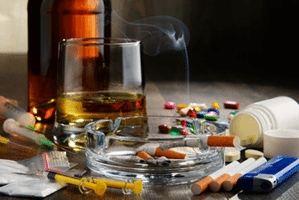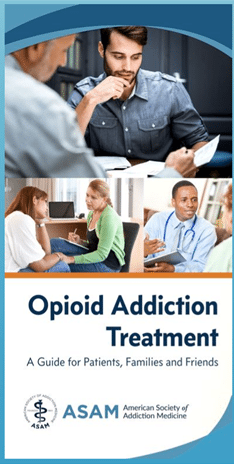Client Education

Suicide Prevention
If you or someone you know is suicidal or in emotional distress, contact the National Suicide Prevention Lifeline. Trained crisis workers are available to talk 24 hours a day, 7 days a week. Your confidential and toll-free call goes to the nearest crisis center in the Lifeline national network. These centers provide crisis counseling and mental health referrals.
SAMHSA’s National Helpline is a free, confidential, 24/7, 365-day-a-year treatment referral and information service (in English and Spanish) for individuals and families facing mental and/or substance use disorders
SAMHSA Treatment Referral Helpline, 1‑877‑SAMHSA7 (1‑877‑726‑4727)

Bullying
Is your mental health, or someone else's, affected by bullying? Learn what to do if you or someone you know is being bullied

Lets talk about it!
OK2TALK is a community where teens and young adults struggling with mental health conditions can find a safe place to talk about what they’re experiencing by sharing their personal stories of recovery, tragedy, struggle or hope. Anyone can add their voice by sharing stories, poems, inspirational quotes, photos, videos, song lyrics and messages of support in a safe, moderated space

PA Medical Marijuana
Pennsylvania Medical Marijuana Program – Learn more at health.pa.gov
Download a postcard explaining how patients can get medical marijuana in Pennsylvania
The Pennsylvania Department of Health is in the process of implementing the state’s Medical Marijuana Program, signed into law on April 17, 2016.
Frequently Asked Questions

Substance abuse or Dependence
What is addiction?
ASAM defines addiction as “a primary, chronic disease of brain reward,
motivation, memory, and related circuitry,” with a “dysfunction in
these circuits” being reflected in “an individual pathologically pursuing
reward and/or relief by substance use and other behaviors.”
What is substance abuse?
Substance abuse (alcohol or other drugs). Substance abuse is a recognized medical brain disorder. It refers to the
abuse of illegal or legal substances. Alcohol is the most common legal drug of abuse. Substance abuse causes
serious problems at work, school, in relationships, and with the law. Substances that are often abused include:
- Alcohol
- Marijuana
- Tobacco
- Prescription drugs, such as pain pills, stimulants, or anxiety pills
- Methamphetamine
- Cocaine
- Opiates
- Anabolic steroids
- Hallucinogens
- Inhalants
What is substance dependence?
Substance (drug) dependence. Substance dependence describes abuse of drugs or alcohol that continues, even when serious
problems related to their use have developed. Signs of dependence include:
- You need more of the drug to get an effect.
- You have withdrawal symptoms if you decrease or stop using the drug.
- You spend a lot of time getting, using, and recovering from the effects of using drugs.
- You withdraw from social and recreational activities.
- You keep using the drug even though you are aware of the physical, psychological, and family or social problems that are caused by your ongoing abuse.
What are the symptoms of substance abuse or dependence?
- The following are the most common behaviors that signal you have a problem with drug or alcohol abuse:
- You get high on drugs or get drunk on a regular basis
- You lie, especially about how much you are using or drinking
- You avoid friends and family members
- You have given up activities you used to enjoy, such as sports or spending time with non-using friends
- You talk or think a lot about using drugs or alcohol
- You believe you need to use or drink to have fun
- You pressure others to use or drink
- You get in trouble with the law
- You take risks, such as sexual risks or driving under the influence of a substance
- Your work performance suffers due to substance abuse before, after, or during working or business hours
- You miss work due to substance use
- You feel depressed, hopeless, or suicidal feelings
- The symptoms of drug or alcohol abuse may look like other medical problems or mental health conditions. Always consult your health care provider for a diagnosis.
How is substance abuse or dependence treated?
Your health care provider will figure out the best treatment for you based on:
- How old you are
- Your overall health and medical history
- How sick you are
- How well you can handle specific medications, procedures, or therapies
- How long the condition is expected to last
- Your opinion or preference
Treatment for drug addiction is serious and complex. People who are addicted can’t simply stop using. Treatment programs
involve many different components. You can take part in inpatient or outpatient treatment programs for substance abuse.
Programs are usually based on the type of substance abused. Programs include:
- Detoxification, if needed
- Medications for withdrawal, to lessen cravings, and to restore normal brain function
- Behavioral therapy
- Long-term medical follow-up and support
- Counseling for both you and any family affected
What are the complications of substance abuse or dependence?
Complications of drug abuse or dependence vary depending of the drug or substance being used. They
may include:
- Liver damage
- Heart damage
- Increased risk for infections such as HIV and other sexually transmitted infections
- Pneumonia
- Tuberculosis
- Injuries for yourself or others
- Weight loss
- Sleep disturbances
- Sexual dysfunction
- Depression
- Thoughts of suicide
- Anxiety
- Psychosis
Opioid Addiction Treatment

Suggested Resources
Aids family members in coping with the aftermath of a relative's suicide attempt. Describes the emergency department treatment process, lists questions to ask about follow-up treatment, and describes how to reduce risk and ensure safety at home.
Family Therapy Can Help: For People in Recovery From Mental Illness or Addiction
https://store.samhsa.gov/product/Family-Therapy-Can-Help-For-People-in-Recovery-From-Mental-Illness-or-Addiction/SMA15-4784
Explores the role of family therapy in recovery from mental illness or substance abuse. Explains how family therapy sessions are run and who conducts them, describes a typical session, and provides information on its effectiveness in recovery.
It's Not Your Fault (NACoA)
Assures teens with parents who abuse alcohol or drugs that, "It's not your fault!" and that they are not alone. Encourages teens to seek emotional support from other adults, school counselors, and youth support groups such as Alateen, and provides a resource list.
https://store.samhsa.gov/product/It-s-Not-Your-Fault-NACoA-/MS732
It Feels So Bad: It Doesn't Have To
Provides information about alcohol and drug addiction to children whose parents or friends' parents might have substance abuse problems. Advises kids to take care of themselves by communicating about the problem and joining support groups such as Alateen.
https://store.samhsa.gov/product/It-Feels-So-Bad/SMA12-4160
What Is Substance Abuse Treatment? A Booklet for Families
https://store.samhsa.gov/product/What-Is-Substance-Abuse-Treatment-A-Booklet-for-Families/SMA14-4126
Created for family members of people with alcohol abuse or drug abuse problems. Answers questions about substance abuse, its symptoms, different types of treatment, and recovery. Addresses concerns of children of parents with substance use/abuse problems.
Alcohol and Drug Addiction Happens in the Best of Families
Describes how alcohol and drug addiction affect the whole family. Explains how substance abuse treatment works, how family interventions can be a first step to recovery, and how to help children in families affected by alcohol abuse and drug abuse.
https://store.samhsa.gov/product/What-Is-Substance-Abuse-Treatment-A-Booklet-for-Families/SMA14-4126
For additional resources, please visit the SAMHSA Store.



